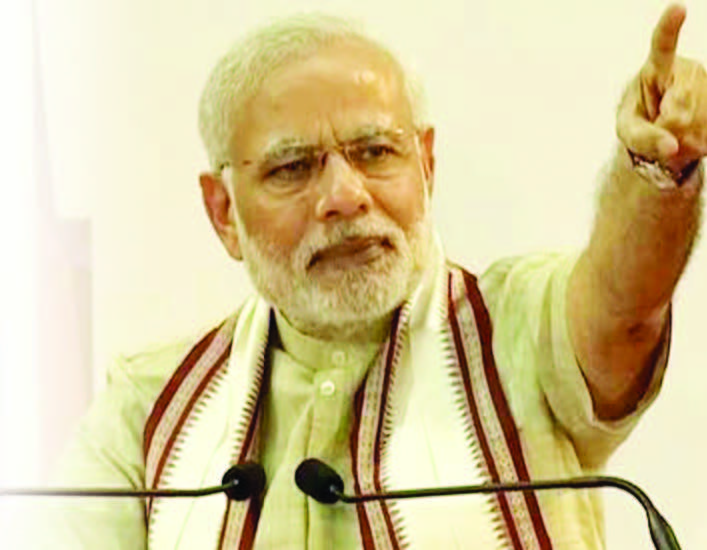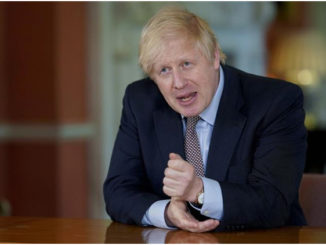
DUBAI (TIP): There are about 700 flights every week from India to the Gulf region, the largest to any foreign region, and yet it took 34 years for an Indian Prime Minister to visit it, said Prime Minister Narendra Modi to a cheering and highly charged up audience at the jam-packed cricket stadium here.
The rockstar style address, UAE version of his Madison Square performance, generated a huge response and reflected his continued popularity with the NRIs. A home to over 2 million Indians or nearly 30 per cent of its population, a visit to the UAE by an Indian prime minister, was indeed, overdue.
However, it was not just the visit but the signals it emanated after Modi’s talks with the UAE leaders that are of marked significance. The joint statement at the end of the visit has brought out India and the UAE together to focus on terror. The forthright condemnation of nations using religiously motivated terrorism against other countries reflects clearly India’s concern over Pakistan sponsored terrorism in India. The implicit reference to Pakistan found a resonance in Modi’s speech to the Diaspora where he asked the audience to guess where was it aimed.
For India the references to the source of terrorism was a real strategic gain. It is seen as a major shift in UAE’s policy on the issue which had traditionally remained pro-Pakistan. However, to be fair, UAE had been emerging as a key counter-terror partner for India over the last few years. Long a safe haven for terrorists and fugitives like Dawood Ibrahim and Chhota Shakeel, the UAE has been of late more receptive to cooperation with India. Terrorists are finding it harder to use the UAE as a base. It is no longer providing shelter to the accused wanted in India for terror activities. In fact the 1993 Mumbai serial bombing accused Tahir Merchant is facing trail because the UAE authorities had nabbed him and had deported him to India. There have been several other instances of cooperation extended by UAE to the Indian authorities. It may be due to its realization of growing threat from terror groups but the India-UAE declaration has given a clear signal to those promoting religious terrorism.
Apart from the indications towards Pakistan, Modi’s visit has yielded several other possibilities of mutual benefit. The $ 75 billion target for UAE investments in Indian infrastructure projects is part of the joint declaration. Bilateral trade between the two has grown to $30 billion (Rs 1.95 lakh crore). India is UAE’s second largest trading partner while UAE is India’s third largest trading partner. Remittances from the UAE total over $11 billion (Rs 71,500 crore) annually, sustaining the economies of states like Kerala.
As per the January 2015 figures of the Ministry of Overseas Indian Affairs, over 7.2 million, or a quarter of the total overseas Indian population of 28 million live in the six Gulf countries of Bahrain, Kuwait, Oman, Qatar, Saudi Arabia and the UAE. Some 50 per cent are in unskilled or semi-skilled jobs, and 30 per cent are in medium-skilled professions. Only about 20 per cent Indians are highly skilled professionals. The largest chunk of remittances to India comes from the UAE -some estimates put it as high as US $ 12 billion per annum.
The visit also assumed significance because Modi had been criticized for looking East and West but had been ignoring the Islamic world. That perception no longer holds good. Apart from Bangladesh, the prime minister had recently visited several Muslim-majority Central Asian countries last month both before and after the BRICS and SCO summit meetings in Ufa, Russia.
His two-day visit to the UAE is, however, important for two other specific reasons. First, it re-established the balance between the Modi government’s lean-Israel policy and the Arabian Gulf states. Second, with the UAE playing an active role in the Saudi Arabia-led war in Yemen against the Shia Houthis, India needs to deepen counter-terrorism links in the Middle-East. The UAE, also Sunni majority, remains largely peaceful but its participation in the Yemen war as well as strikes by its Air Force over IS positions in Syria make it vulnerable to future terrorist attacks. Obviously, this vulnerability has made the UAE take India’s concerns over terrorism seriously.
The prime minister’s visit to the Sheikh Zayed Grand mosque in Abu Dhabi was a political coup. The UAE has also now pledged to allot land for the construction of a Hindu temple, an announcement that was greeted with a huge applause in the Dubai Cricket ground.
Unlike Indians settled in the US and many other countries, Indians in the UAE are mostly unskilled workers. And unlike other NRIs elsewhere, they are not citizens of the country where they work. They will have to one day return to India. Modi obviously also had an eye on the voters back home. Little wonder he mentioned sawa crore des wasio even when he was speaking to a limited audience in the cricket ground.





Be the first to comment